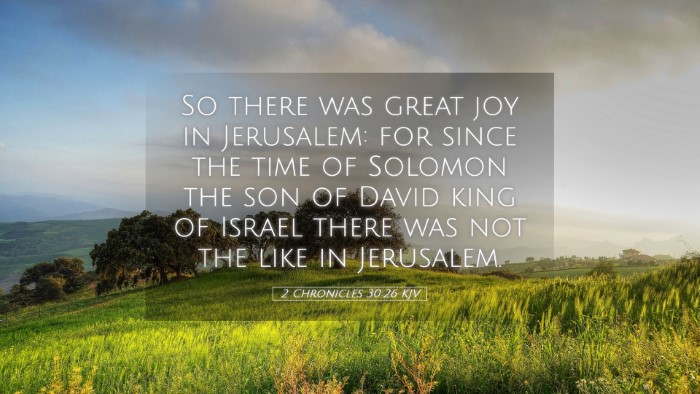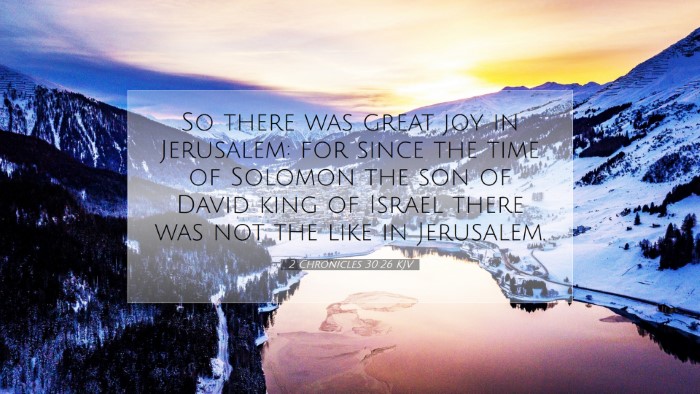Commentary on 2 Chronicles 30:26
Verse: "So there was great joy in Jerusalem; for since the time of Solomon the son of David king of Israel there was not the like in Jerusalem."
Introduction
In 2 Chronicles 30:26, we find an extraordinary expression of corporate joy and divine favor among the people of Jerusalem. This verse highlights a significant moment in the history of Israel, marked by renewed worship and communal celebration following the Passover. This commentary draws upon the insights of renowned Biblical commentators including Matthew Henry, Albert Barnes, and Adam Clarke to explore the theological, historical, and practical implications of this verse.
Contextual Background
The events leading up to 2 Chronicles 30 revolve around King Hezekiah's efforts to restore proper worship in Judah. After a prolonged period of idolatry and neglect of the Temple, Hezekiah invites the people to celebrate the Passover, which had not been observed properly for generations. This initiative not only aims to reinstate the significance of the festival but also to unify the people in worship through repentance and sacrifice.
Historical Setting
Matthew Henry notes that this event took place in a time of widespread apostasy, and the actions of Hezekiah signify a pivotal moment of revival. It reflects the king's zeal for the Lord and a desire to return to the covenantal faithfulness that characterized the reign of David and Solomon.
The Significance of the Joy
Here, the joy is not merely an emotional response but a profound acknowledgment of God’s mercy. Albert Barnes emphasizes that the true joy emanating from a restored relationship with God transcends temporary feelings, signaling a deeper, spiritual revitalization among the people.
Theological Insights
The verse encapsulates themes of joy, corporate worship, and restoration:
- Joy in the Presence of the Lord: The joy expressed is directly linked to the acknowledgment of God's sovereignty and His active presence among His people. Adam Clarke underscores the notion that such joy is always the result of divine intervention and grace.
- Corporate Celebration: The gathering of the people to worship is significant as it illustrates the unity and collective identity of Israel as God’s chosen nation. Matthew Henry remarks that the unity experienced during this celebration is reflective of a heart turned back towards God.
- Contrast with Previous Generations: The reference to Solomon creates a contrast, serving to highlight the decline and subsequent revival. The joy experienced in Hezekiah's reign represents a return to the glory days of Israel's history when worship was central to communal life.
Practical Applications
This verse carries several implications for contemporary faith communities:
- Renewed Worship: Just as Hezekiah led the people back to right worship, church leaders are called to foster environments that prioritize worship and repentance. Reflection on personal and communal worship practices may reveal areas needing revitalization.
- Joy as Evidence of Revival: The joy expressed in Jerusalem should serve as an indicator of spiritual health within a community. Where there is genuine revival, there will be authentic expressions of joy and unity among believers.
- Historical Reflection: Christians today can gain insight from Israel's history regarding fidelity to God's commands and the consequences of straying. Regularly revisiting the foundation of faith encourages communities to remain steadfast in their worship and devotion.
Conclusion
The joy mentioned in 2 Chronicles 30:26 is a compelling testament to the transformative power of God’s grace and the effect of collective worship. By drawing together insights from esteemed commentators, we grasp the rich theological threads woven into this verse, promoting a deeper understanding and appreciation of what it means to celebrate God's goodness and mercy.


